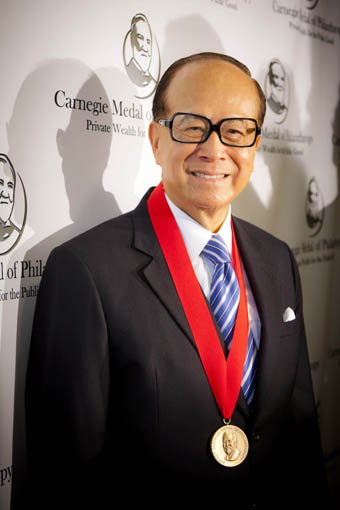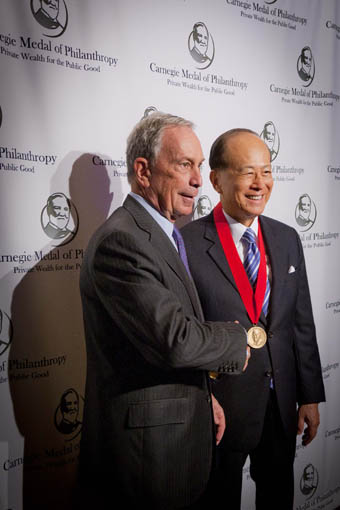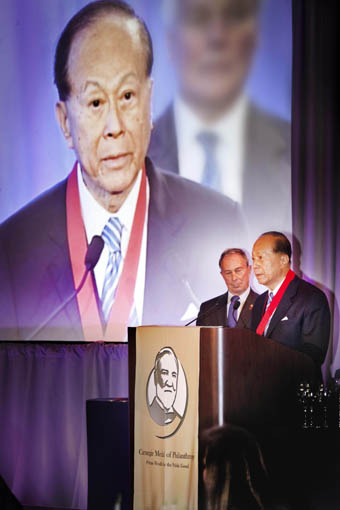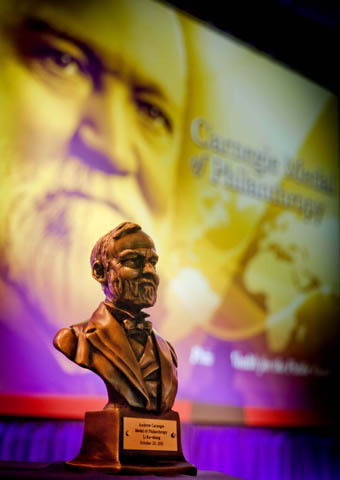For photos, please click here.

(Hong Kong, 21 October 2011) Mr Li Ka-shing, Chairman of the Li Ka Shing Foundation, becomes the first Chinese to have been awarded the Carnegie Medal of Philanthropy since the awards were set up 10 years ago.
The exceptional and unconditional giving by Mr Li, through the Li Ka Shing Foundation ("LKSF"), is recognised and recommended by members of the selection committee, which has also decided to award other eight individuals and families this year for their philanthropic initiatives over the years.
LKSF, set up in 1980, has three strategic focuses: nurtures the culture of giving, supports education reform initiatives that create a paradigm shift to develop human capital for positive and sustainable change, and supports medical research and services in quest for a healthier world.
Attending in person the award presentation yesterday (20 October in New York) held at the New York Public Library, Mr Li gladly received the medal from the New York City Mayor Michael Bloomberg, who was also a Carnegie medalist for 2009.
Speaking at the presentation ceremony, Mr Li said destiny in Chinese language was the confluence of fate and luck, where one's own choice had material influence over outcome.
"I believe our dedication and effort will bring about effective and efficient changes to the world around us. As many of you know, I have often referred to my own commitment to making a difference as being like having a 'third son', in addition to the two sons I have been blessed with in this life. My third son and I are honored to be counted among your company," he said.
 |
| 1. Mr Li Ka-shing is honoured with the Carnegie Medal of Philanthropy at the 10th Anniversary of the award given by the Carnegie Corporation. |
 |
| 2. New York City Mayor and former Carnegie Medal of Philanthropy recipient Michael Bloomberg congratulates Mr Li Ka-shing on receiving the award. |
 |
| 3. Mr Li Ka-shing addresses a capacity crowd at the New York Public Library after receiving the Carnegie Medal of Philanthropy presented by New York City Mayor and former medalist Michael Bloomberg. |
 |
| 4. The Carnegie Corporation honours Mr Li Ka-shing with the Carnegie Medal of Philanthropy in a ceremony at the New York Public Library, 20 October 2011. Mr Li receives the medal along with a bronze bust of Andrew Carnegie. |
About the Li Ka Shing Foundation
The Li Ka Shing Foundation was established in 1980 by global entrepreneur and philanthropist Li Ka-shing. Mr Li considers the Foundation to be his "third son" and has pledged one-third of his assets to it. To date, the Foundation has granted over HK$12.5 billion (US$1.6 billion) in charitable donations, approximately 90 per cent of which has gone to the Greater China region.
The Foundation supports projects that propel social progress and create a cycle of charity in the world through expanding access to quality education and healthcare, encouraging cultural diversity and exploration, and stimulating community involvement and sustainable development. For more information, please visit: http://www.lksf.org.
For media enquiries, please contact:
Li Ka Shing Foundation
Jeremy Lau
Tel: (852) 2128 1207
Fax: (852) 2128 1766
Email: jeremyl@hwl.com.hk
Andrew Carnegie & Carnegie Corporation
Andrew Carnegie, the great Scottish-born American steel baron-turned-philanthropist, founded Carnegie Corporation of New York in November 1911, which was the largest single philanthropic trust that had ever been established. With its original USD 135 million endowment from Mr. Carnegie (equivalent to roughly USD 2 billion today) the Corporation has made grants totaling more than USD 1.4 billion.
At the time of its creation, Andrew Carnegie's vision for the work of the Corporation was unique in that he understood that his Foundation has to respond to changing needs as the decades passed. Therefore he gave his trustees "full authority to change policies or causes hitherto aided" and ran his trust in the form of a commercial corporation.
His vision of "scientific philanthropy" has enabled Carnegie Corporation to operate smoothly throughout nearly one hundred years of grantmaking, and has become the model of modern philanthropy in the US.
About Carnegie Medal of Philanthropy
The Carnegie Medal of Philanthropy was established in 2001 to mark the centennial of Andrew Carnegie's formal philanthropy.
The Medal is awarded every two years to recognize individuals and families with exceptional and sustained records of philanthropic giving. Awardees' philanthropic records embody Andrew Carnegie's ideals that with wealth comes responsibility, and private wealth should serve the public good.
Nomination and Selection
Medalists are nominated by all the Carnegie organizations throughout US and Europe, and selected by a Committee comprised of representatives of seven of those institutions.
The Selection committee is composed of four permanent members - Carnegie Corporation of New York, the Carnegie Endowment for International Peace, Carnegie Institution for Science, and the Carnegie Trusts for the Universities of Scotland - and three rotating members who join the committee each award cycle. Leaders from the 23 Carnegie organizations spend considerable effort to identify and nominate global philanthropic leaders.
Past Medalists
First awarded in 2001, the Carnegie Medal of Philanthropy has been presented to 32 individuals and families who have dedicated their private wealth to the public good.
Some world-known past winners include New York City mayor Michael Bloomberg in 2009, founders of IT firm HP: Hewlett and Packard Families in 2005, CNN founder Ted Turner, Bill Gates & his family, and George Soros in 2001.
at the Carnegie Medal of Philanthropy presentation ceremony
20 October 2011
New York Public Library
Li Ka-shing
Li Ka-shing, you are an extraordinary philanthropist. Like Andrew Carnegie in his time, you are forging new paths of benevolence, demonstrating the power of using great private wealth for the public good. Although you oversee two multinational groups with 240,000 employees in 52 nations, your true calling is running your foundation. Calling it your "third son," you have pledged to give one-third of your fortune to support its endeavors worldwide. As you have said, "To be able to contribute to society and help those in need to build a better life - that is the ultimate meaning in life."
Your early years were filled with hardship. At the age of 12, you were forced to flee with your family to Hong Kong to escape the perils of war. Soon after, your father died of tuberculosis and, as the eldest son, you had to abandon school to become the family's provider, an experience that gave you a deep appreciation of the need for better educational opportunities and health care. When you were only 14 years old you were laboring 16 hours a day in a plastics manufacturing company. But by age 22 you had your own factory that, in time, became the largest maker and exporter of plastics in Hong Kong. Today, as the chairman of the hugely successful global corporations, Cheung Kong Holdings and Hutchison Whampoa, you devote much of your time and wealth to helping others.
The Li Ka Shing Foundation, which you established in 1980, has provided over $1.6 billion to support creative, constructive, and sustainable projects in education, health care, culture, and the arts. Shantou University, which you founded in 1981 in your home town, is meant to engineer reforms in China's education system, and is especially dear to your heart. Your far-reaching altruism reflects your faith in the power of combined efforts, the importance of those who are too often overlooked, and the responsibility to lift one another up. As your foundation has grown, you have introduced Asia to a culture of giving. You serve as an example to others so that they may join you in a new spirit of philanthropy that will transcend the traditional values requiring wealth to pass through lineage. In your dedication to social progress, innovation and creativity you live by Andrew Carnegie's words, which could well be your own: "There is nothing inherently valuable in mere money worth striving for, unless it is to be administered as a sacred trust for the good of others." Li Ka-shing, on behalf of our nation and all nations, for your sacrifice of time, energy and resources to helping others regardless of race, class, or circumstance, we honor you and offer our sincere thanks.
Carnegie Medal of Philanthropy Award Ceremony
October 20, 2011
Dr. Gregorian, Mr. Mayor, Members of the Selection Committee, Ladies & Gentlemen:
I am truly grateful for the great honor you have conferred on me with this award.
I have often wondered if we could aggregate on a balance sheet all that we have accomplished or lost throughout mankind's long journey to where we are today, what would be the truest and most fair view? Would the assets of our cumulative achievements exceed our many failings? Reflecting back on the past, it is clear that the histories of both nations and individuals are marked with roads not taken, duties not fulfilled and opportunities for growth, affluence and prosperity needlessly, often tragically squandered. Sometimes, it does indeed seem that all our progress in abundances pales in comparison to a growing sense of bitter disenchantment.
I am certain many of us here today believe that in a world increasingly filled with complexity of all kinds, progress is not linear. To borrow the words of Dr. Martin Luther King on the steps of the Alabama State Capitol, the "long arc of the moral universe" is a work in progress. It needs our conscious collective effort to bend it toward justice and compassion. Those of us who have the good fortune of success must remain committed and determined to build a life of success that can make a difference for others.
In our Chinese language, destiny is the confluence of fate and luck - where one's own choice has material influence over outcome. I believe our dedication and effort can bring about effective and efficient changes to the world around us. As many of you know, I have often referred to my own commitment to making a difference as being like having a "third son", in addition to the two sons I have been blessed with in this life.
Ladies and Gentlemen, my third son and I are honored to be counted among your company today.